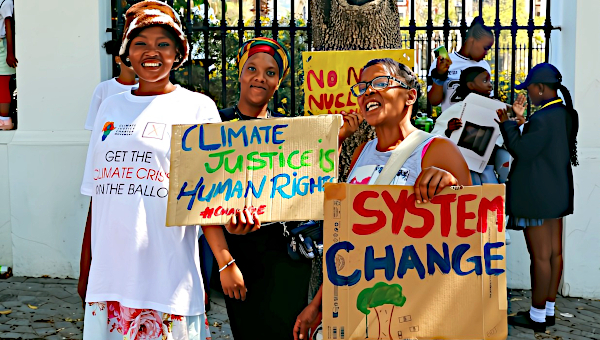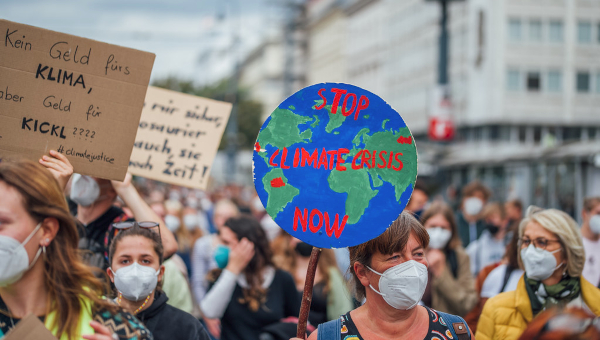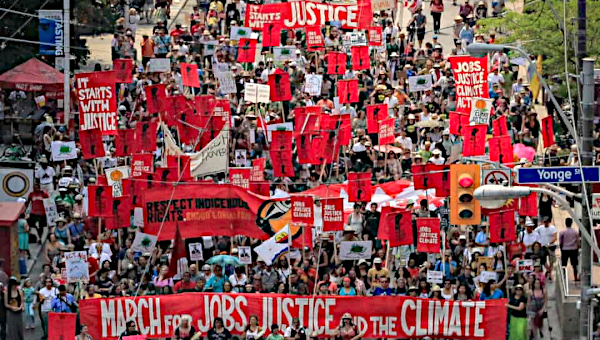Rebellion Against the Legalized Robbery
The following commentary was written by Marxist economist, politician and former Finance Minister of Greece Yanis Varoufakis. He follows the first part of the debate “Ecological Catastrophe, Collapse, Democracy and Socialism” between the renowned American intellectual Noam Chomsky, the Chilean exponent of the new ideology of Collapsist Marxism Miguel Fuentes and climate scientist Guy McPherson. One of the main characteristics of Varoufakis’ comment (who describes himself as a “Libertarian Marxist”) is offering a balanced review of some of the main ideas expressed earlier in this debate. The latter from the perspective of the implications of current geopolitical events such as the Russo-Ukrainian war and what Vafourakis has defined as the beginning of a new Cold War. Varoufakis’ commentary thus constitutes both a necessary update and an informed closure of the first part of this ongoing discussion.
The first part of the debate between Noam Chomsky, Miguel Fuentes and Guy McPherson and the critical comments of John Bellamy Foster and Max Wilbert can be found here: marxismoycolapso.com.
— Marxism and Collapse
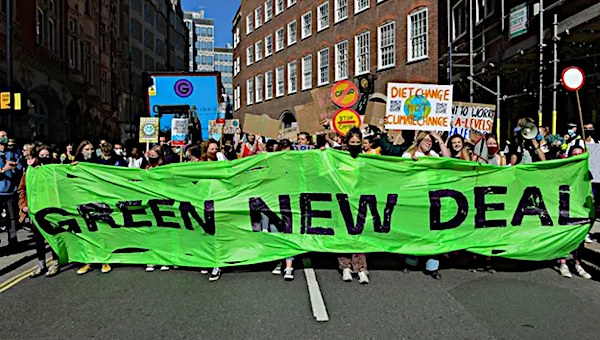
Our Task? To Inspire the Rebellion Against the Legalized Robbery of People and Earth, Even if it is Too Late
Have we, humans, passed the point of no return down the path to ecological ruin? Does ruin-without-end loom black across the land, the air, the oceans? I hope not but, regardless, I don’t think it matters. What matters is what we do. And how we do it. From now on. Until our last breath.
Sure enough, three centuries of industrialization dictated by the logic of capital pushed us into a hideous predicament: Whatever we do from now on may, I acknowledge, prove insufficient for preventing the collapse of organized human society. Even so, radical humanists ought to think it necessary to do our best to resist civilizational collapse. As an old-school Marxist once taught me, what is necessary is never unwise, never futile, never worthless – even if it is as hard to accomplish as hitting a bullet with another bullet fired from a handgun while riding a runaway horse.
I am no climate scientist, so I shall say nothing about our proximity to the point of no return. Instead, I shall focus on the political economy of what it means to do our best in view of our capacities and in the face of ecological and civilizational collapse. My focus shall be on what we can do, as activists, to help translate humanity’s remaining capacities into the necessary praxes, into the collective actions that will permit us jointly to say: “We did our damned best!”
The Final Battle
Two of our greatest obstacles: Baseless optimism is one. And self-indulgent pessimism is the other. In fact, I would go so far as to proscribe prognosis altogether. Prediction is not our friend. We know everything we need to know in order to act: humanity is on a path to ruin without any guarantee that we can turn back. That’s enough knowledge. Unlike astronomers seeking to predict the trajectory of a faraway comet, our current task is not, and should never be, to predict the trajectory of climate change. Astronomers have the luxury of knowing that the phenomenon they study (the comet) doesn’t give a damn about their predictions of its trajectory. We don’t have this luxury. Our predictions, to the extent that enough people take them seriously, are crucial determinants of what people do. Thus, the phenomenon we are struggling to fathom and control (e.g., humanity-driven climate change) cares deeply about our predictions and, in an infinite regress, is bound violently to react to them – rendering our predictions useless and, potentially, causing us to lose any control over the phenomenon we might have had.
What should our task be, once forecasting is out? My answer is: To end the legalized robbery of people and Earth fuelling climate catastrophe and the broader ecocide. Even if it is too late, at least let’s go out with a revolutionary bang. Let the last feeling we have be that we did what we could, albeit belatedly. To accomplish this, we must inspire the multitudes to join our rebellion. But to inspire them, we need to articulate a Program that addresses people’s hearts and minds. What should that Program consist of? This is the pressing question.
In the Face of the Collapse of Civilization:
The Need for a New Revolutionary Program
Our Program should avoid excessive optimism and the insinuation that climate change is a technical problem calling for a technical fix. Smart technological solutions funded by clever public finance will not save the Earth just because they are feasible (even if they are!). Equally, it would be a terrible defeat for progressives to dismiss the capacity of science, technology and public finance to be part of a Program that succeeds in saving humanity and the planet. Giving up on humanity and its collective ingenuity may be tempting in times like the present, when war is once more turbocharging the fossil fuel industry. Alas, such defeatism is impermissible for progressives. This, our darkest hour, is precisely the time when we, progressives, radicals and revolutionaries, must give back rational hope to those who have been deprived of it.
Which brings me to the debate between, on the one hand, Noam Chomsky and, on the other, Miguel Fuentes and Guy McPherson.1 As ever, when it comes to passionate debates between radicals whose objectives coincide but who disagree regarding strategy and constraints, it is important to take a step back so as to appreciate the room for synthesis. In the following paragraphs, I shall attempt such a dialectical synthesis for one purpose: to establish the common ground that is a prerequisite for a common Program that inspires the multitudes to coalesce internationally so as to end the legalized robbery of people and Earth.
Let me begin with Noam’s position, which I understand intimately having myself been a proponent of a Green New Deal since 2001. A large public investment in humanity’s green transition (Noam suggested 2%-3% of global GDP, I raise this to at least 5%) can make a decisive dent in our collective carbon footprint. Public financial instruments can be constructed to mobilize these funds globally. Exponential technological advancements in solar, wind, green hydrogen, organic agriculture, etc. are feasible. Technically (both in terms of engineering and public finance), an effective green transition is possible without a revolution, under the present global exploitative system. However, the operative word here is: Technically.
Politically, I cannot see how the current oligarchy-without-frontiers will allow the green transition to happen. Green Keynesianism will not work for the reasons Michal Kalecki gave decades ago to explain why the original Keynesianism would never be allowed to run its course. In short, because even if the bourgeoisie panics and adopts Keynesian (today Green Keynesian) policies to save its skin, the very moment these policies begin to bear fruit, and well before they do their job, the ruling classes will abandon them in favour of their usual extractive, austerity-driven policies. It is in the capitalist class’s nature to block the very road that leads to its own salvation.
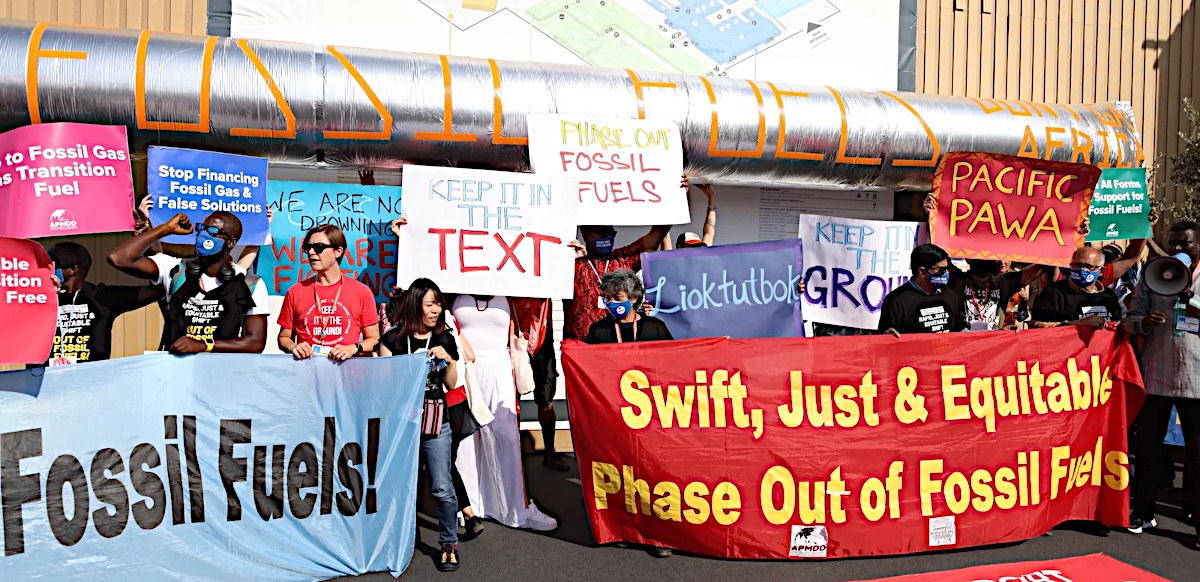
So, why do people like Noam Chomsky and myself still put forward Green New Deals or Green Keynesian-like policy proposals? Are we so naïve as to imagine that our sensible arguments will win over the capitalist oligarchy? I assure you dear reader that we have no such illusions. No, the reason we do it is because their mere advocacy is full of revolutionary potential. Let me explain this by comparing three different strategies of how to approach the many who are impervious to the language of us radical leftists – with a view to mobilizing them. Compare and contrast three things we could say to them:
Strategy 1: “Nothing will save humanity except revolutionary socioecological changes that include (A) the socialization of property rights over the means of production and (B) painful decisions on how to de-grow our economy in favour of Nature and of our cultural and spiritual lives. Join us!”
Strategy 2: “Humanity is doomed. We are past the point of no return. The collapse of our ‘civilization’ is inevitable. Let’s embrace collapse and see how best to organize whatever life survives within the ruins.”
Strategy 3: “Here is a bunch of policies that can be implemented today, even under the existing system, to shift massive funds to the green transition, to provide basic public goods to everyone, especially in the Global South, to eradicate unpayable debts, to pay you a basic income wherever you live on the planet, etc.”
The Need for a Green New Deal?
Strategy 1 involves telling people out there the naked truth about the need for a revolution which they, nevertheless, are unprepared psychologically to fathom, let alone to stage. Indeed, Strategy 1 will cause anyone who is not already a card-carrying revolutionary to yawn and move on, with their heads tilted to the floor, unable to muster any enthusiasm for joining us to rebel against the systematic looting of people and planet. Similarly with Strategy 2, which will probably only benefit psychoanalysts whose clientele will burgeon, not to mention end-of-the-world prophets of doom whose congregations will grow. Only Strategy 3 stands a chance of mobilizing those whom we, the radical left, have failed to mobilize. Here is why.
If the policies of our Green New Deal make sense in the mind of reasonable people who are discontented with the grim social and ecological realities surrounding them (yet who are no revolutionaries), it should be possible to convince them that these policies, technically, can be implemented immediately. Without a revolution. Within the current system (like, for example, Roosevelt’s neutering of the banking sector did not require a prior overthrowing of capitalism). Once this realisation is planted in people’s heads, it is plausible that a radical question will hit them: “If these things could be done today to benefit humanity, without some socio-ecological revolution, why on Earth are the authorities not doing them?”
It is at that point that the ears and minds of the many will be readied for the explanation which only radicals can offer them: That, yes, though technically feasible, these policies are ignored by an establishment solely interested in profit that is maximised by methods that destroy lives, ecosystems, capitalism’s own sustainability even. That will be the point when we, radicals, will get our chance to influence the many, to radicalize them.
As I was reading Miguel Fuentes’s and Guy McPherson’s rejoinders to Noam Chomsky, I was struck and concerned by their embrace of defeat. Sure enough, I understand their radical rejection of baseless optimism and of those who treat ecological disaster as a technical problem. On the other hand, it seems to me that if civilizational collapse is the answer, we are asking the wrong question. That if the Left must fall back onto a neo-Malthusianism, which places its hope on death as the only possible cure to the plague that is humanity, we have lost our way. We, the Left, were defeated at a planetary scale in 1991, and since then we have been failing to recover, despite the occasional revolutionary moments that revived our spirits temporarily. But vengeance and defeatism are lazy forms of grief. Giving up on humanity because humanity gave up on us, on the Left, is an affront to the values the left was born to serve.
Wishful thinking, of a Keynesian or social democratic kind, is not the answer either. Without a socio-ecological revolution humanity is doomed. Green Keynesianism will never be implemented to any degree equal to the task. As for the green technologies developed under capitalism, which could make a difference (e.g., green hydrogen), they will never be developed fully by a system which has a natural propensity to continue cannibalizing what remains of our commons. The delicious irony is that for a fully-fledged Green New Deal to be implemented a revolution must precede it. And there’s the rub: For a revolution to precede any Green New Deal, we need rational rage to overcome the hearts and minds of people who are not yet revolutionaries. To engender this rational rage, the many need to be exposed to our Green New Deal policy proposals, to be convinced by them before watching the establishment shoot these proposals down.
Then and only then might the rational rage that is necessary to motivate them crawl up their spine, bolstering it enough to cause them to join us in rising up, en masse, against the incessant looting of people and Earth. •
This article first published on the meta website.
Endnotes
- The first part of the debate between Noam Chomsky, Miguel Fuentes and Guy McPherson and the critical comments of John Bellamy Foster and Max Wilbert can be found here: marxismoycolapso.com.


